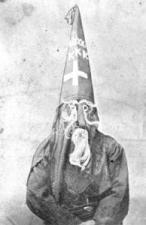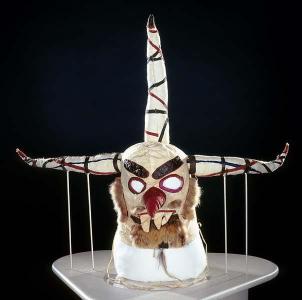A Declaration of Insurrection
Violence by the Ku Klux Klan within North Carolina had been increasing over the course of 1869, an attempt to curb the political influence of white Republicans and the newly won civil rights of Black citizens. Klan members largely targeted Black men, women, and children. Among the earliest victims of Klan violence during Governor Holden's administration was Daniel Blue.
Blue was an African American man who resided in Moore County with his family. In February 1869, the Klan entered the family's home and murdered Blue's wife and children. After the murders, Klan members burned the house—with the bodies of the deceased still inside—to the ground.
Photograph of hooded member of the Ku Klux Klan, c. 1870. Courtesy of the State Archives of North Carolina.
Photograph of the Caswell County Courthouse in Yanceyville. Courtesy of Jimmy Emerson, DVM.
Influential African American politicians were also targeted by the Klan. On February 26th, 1870, a Black U.S. Army veteran and town commissioner named Wyatt Outlaw was lynched by Klan members on the grounds of the Alamance County courthouse. Wyatt had committed no particular "crime," a Klan member later testified. He was hanged simply "because he was a politician."
As winter turned to spring, the Klan continued their campaign of murder and terror. However, the act that would prompt Governor Holden to declare war on the Klan was the murder of John Walter Stephens.
John Walter Stephens was a prominent Republican senator from Caswell County. Despite being warned not to attend the 1870 Democratic convention at the Caswell County courthouse, he attended anyway. Stephens was at the courthouse supporting his friend Frank Wiley in an attempt to get him to run for Sheriff of Caswell County on a Republican ticket. Unknown to Stephens, however, Wiley had already made a deal with the Klan. Wiley lured Stephens into an office, where Klan members subjected him to a mock trial. Finding him "guilty" on charges of arson and extortion, the Klan then murdered Stephens and left his body in the courthouse.
The Klan's previous outrages had certainly horrified Governor Holden, but the brazen murder of Stephens, who was a legislator at the time of his death, compelled him to escalate his response dramatically. It was time to fight back. Invoking the recently passed Schoffner Act—championed by Republican state senator Tetman M. Schoffner of Alamance County—Governor Holden declared the counties of Alamance and later Caswell to be in a states of insurrection and deployed militia forces to round up and arrest Klan members.
A Ku Klux Klan mask from c. 1870-1872. Masks were designed to conceal the wearer's identify and terrorize the group's victims. Courtesy of the North Carolina Museum of History.



